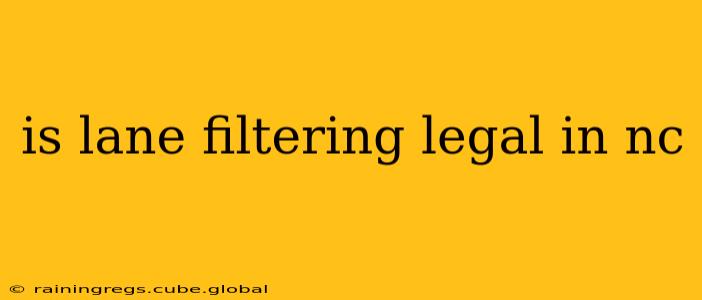Lane filtering, also known as lane splitting, is the practice of a motorcycle riding between lanes of slow- or stopped traffic. The legality of this practice varies widely across the United States, and North Carolina is no exception. The short answer is: No, lane filtering is not explicitly legal in North Carolina. However, the situation is more nuanced than a simple yes or no.
This guide will explore the legal landscape of lane filtering in NC, addressing common questions and concerns surrounding this practice.
Is Lane Filtering Legal in NC? The Specifics
North Carolina's motor vehicle laws don't contain a specific statute addressing lane filtering. This lack of explicit permission, however, doesn't automatically equate to legality. The state's general traffic laws must be considered. Riding between lanes could be interpreted as violating regulations regarding:
- Unsafe lane changes: Lane filtering inherently involves moving between lanes, and doing so unsafely could lead to a citation. This is dependent on specific circumstances, including speed, visibility, and traffic conditions.
- Following too closely: Filtering often requires close proximity to other vehicles, potentially breaching laws against tailgating.
- Reckless driving: If a motorcyclist engages in lane filtering in a reckless manner, jeopardizing the safety of other drivers and themselves, they could be charged with reckless driving.
Because of this ambiguity, it's crucial for motorcyclists to exercise extreme caution. Even if a situation seems safe for filtering, the lack of clear legal precedent leaves riders vulnerable to potential penalties.
What are the Risks of Lane Filtering in North Carolina?
The risks associated with lane filtering extend beyond potential legal ramifications. Safety is paramount:
- Increased risk of accidents: Close proximity to other vehicles greatly increases the risk of collisions, particularly if drivers are unaware of the motorcyclist. Unexpected movements by other vehicles pose significant danger.
- Difficulty in being seen: Motorcyclists are already less visible than larger vehicles. Filtering further reduces visibility, increasing the chance of being overlooked by drivers.
- Unpredictable traffic conditions: Traffic flow can change rapidly, creating dangerous situations for filtering motorcyclists.
What are the Alternatives to Lane Filtering in North Carolina?
Instead of lane filtering, motorcyclists in North Carolina should consider safer alternatives:
- Patient riding: Waiting for traffic to clear is always the safest option.
- Using designated motorcycle lanes: Where available, use designated motorcycle lanes for efficient and safe travel.
- Proper lane positioning: Maintain a safe following distance and be highly visible to other drivers.
Can I get a ticket for lane filtering in North Carolina?
While there's no specific law against lane filtering, a police officer could issue a citation for related offenses, such as reckless driving, unsafe lane changes, or following too closely. The specific charge depends on the circumstances of the event and the officer's judgment.
Is lane filtering ever acceptable in North Carolina?
No. Even in seemingly safe conditions, the lack of clear legal permission and the significant safety risks make lane filtering unacceptable in North Carolina. The potential penalties and inherent dangers outweigh any perceived benefits.
What should I do if I'm pulled over for suspected lane filtering in NC?
Remain calm and polite. Cooperate with the officer, providing your documentation as requested. Do not admit guilt and politely explain your actions. Consult with a legal professional if you receive a citation.
In conclusion, while there is no specific law prohibiting lane filtering in North Carolina, the practice is inherently risky and carries the potential for legal consequences. Safe riding practices, prioritizing caution and awareness, are crucial for motorcyclists in the state. The absence of explicit permission, coupled with potential violations of existing traffic laws, strongly advises against lane filtering in North Carolina.
